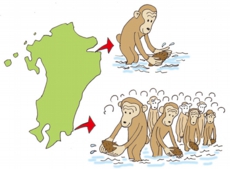I talked about cherry blossoms in the last one. Isn’t the scene filled with full blooming cherry blossoms every year great? Because those blooming flowers are seen every single year, I can’t help feeling that there must be something like a bond among them which we can’t see with our eyes. After the cherry blossom season finishes, other plants start having flowers, sprouts out and so on. Looking at these plants’ activities makes me think that there is always invisible tidal current of life among them and always a response (=communicate) with each other. Then, when the right time comes, each flower blooms at the same time in certain area.

The title at this time, “Lifetide”, is a name of a book which was written by Dr. Lyall Watson and published in 1979. In this book, there is a story of “Hundredth Monkey”. Some people may have heard of it, I suppose. Also, a company president of a consultancy company introduced about this “Hundredth Monkey” in his own book and it became a bestseller.

The story is that one day a monkey which lived in Koujima in Miyazaki Prefecture learned to wash sweet potatoes before eating, and the behavior spread from one group to all related groups which were isolated from the original group once a critical number of initiates is reached.
So, this mysterious phenomenon is called “The hundredth monkey effect”. It can appear all of sudden at a place that has no connection to the original place.

It seems that they have a telepathic connection, doesn’t it? Suppose that one day, all the people in Japan could start acting the same at the same time all of sudden by using telepathy. It sounds strange, does it? How about a monkey that gets a smartphone and tweets on Twitter that “I’m going to wash sweet potatoes before eating from today”? All the monkeys will start doing the same thing in the next moment. The monkeys could become very intelligent. We are just like the monkeys with cell-phones anyway, so we won’t be surprised though.

In fact, there is another story of “The hundredth monkey effect”, which Lyall Watson confessed that “It was a lie and fake story”. So, we all got swayed by him after all….
Anyway, his story made us believe it easily. Because things we don’t know in the world are more than the ones we do know, it may be fun for us to believe such things. Some of them could be true after all.
*Even though Watson’s story was a lie, I remember that Jung the psychologist said something similar….I think it was “Collective unconscious”….Am I wrong?
*Talking about “monkeys”, the late Kyoto University Professor, Kinji Imanishi (1902-1992), must have something to do with it and should be able to tell us something fun, as he was a founder of Japanese primatology.

